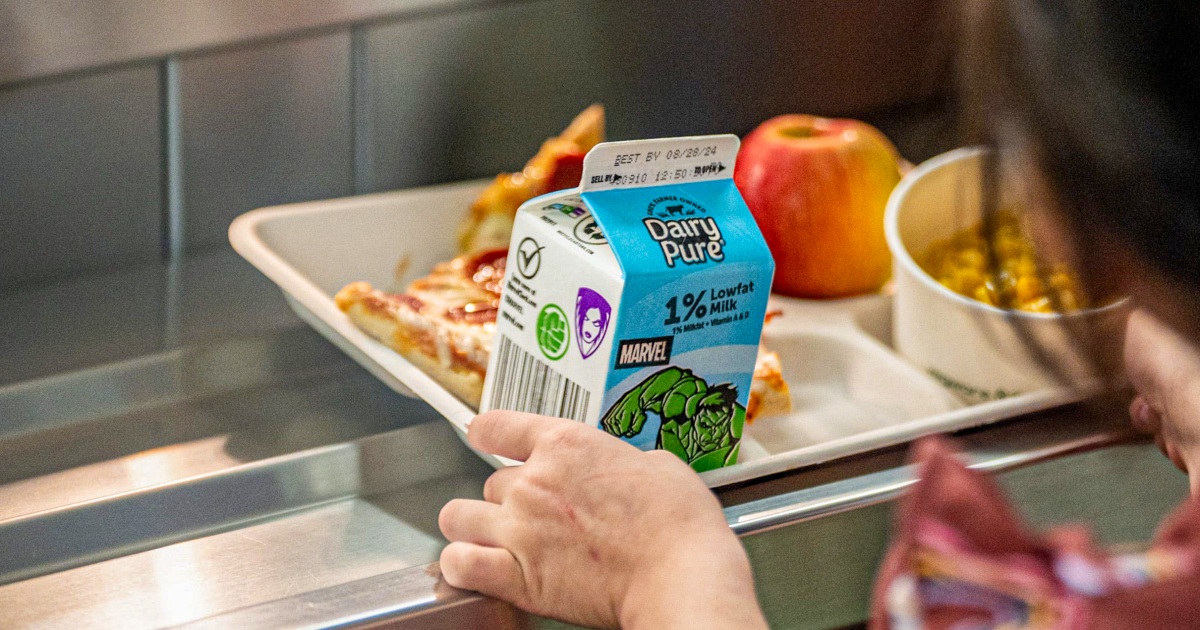A group of senators has demanded that U.S. officials prohibit transaction fees on school meal accounts, arguing that the companies that process students’ lunch payments are unnecessarily raising costs for families.
In a letter to Agriculture Secretary Tom Vilsack sent Wednesday evening, Sen. Elizabeth Warren, D-Mass., and seven other senators urged immediate action from the Agriculture Department, which administers the program that serves billions of meals to students nationally each year.
While the meals are low-cost (or free in some cases), families are often hit with “exorbitant” fees from private payment processors when they deposit money into their children’s accounts, the letter said.
“Every day, greedy payment processing companies are ripping off working families, snatching dollars meant to pay for kids’ school lunches in order to pad their profits,” read the letter, which was shared first with NBC News. “It is unacceptable that parents face exorbitant fees just so their children can eat school lunch, and USDA should prohibit these sham fees.”
The letter, signed by seven Democratic senators and independent Sen. Bernie Sanders, of Vermont, comes two months after a report on school meal payment processors from the Consumer Financial Protection Bureau, a government agency that works to ensure fairness in the marketplace. The report found that the companies collect more than $100 million in transaction fees a year.
While school meal prices vary throughout the country, a survey conducted by the School Nutrition Association, a trade organization, found that lunches typically cost about $2.83 for elementary school students, $3 for middle school students and $3.05 for high school students. School breakfasts typically range from $1.75 to $1.80.
The prices mean that the $100 million in transaction fees could have bought another 33 million or so school lunches or over 55 million school breakfasts.
“Junk fees on school lunch should not exist. When kids pay for their school lunch, their families shouldn’t be squeezed by online payment processors for every last nickel and dime,” Warren said in a statement to NBC News.
Sen. John Fetterman, D-Pa., who also signed the letter, called the actions of payment processors “just plain disgusting.”
“These junk fees are screwing over hard-working parents. It’s time the USDA put an end to this shakedown and stand up for families, not big corporations looking to steal kids’ lunch money,” he said in a statement to NBC News.
Processing payments disproportionately burden lower-income households, according to the July report. That’s because families with lower incomes often make smaller, more frequent deposits into their children’s school lunch accounts, and many payment platforms charge flat fees for each deposit.
The fees can add up. Families whose incomes are 130% to 185% of the poverty level, making them eligible for reduced-price meals, may send 60 cents to payment processors for every $1 they spend on school lunches, or about $42 over the school year, the report said.
“These fees represent usurious profiteering by payment processors and must be stopped,” read Wednesday’s letter, which, in addition to Warren, Sanders and Fetterman, was signed by Sens. Bob Casey, of Pennsylvania, Debbie Stabenow, of Michigan, Sherrod Brown, of Ohio, Raphael Warnock of Georgia, and Brian Schatz, of Hawaii.
While the Agriculture Department instructs school districts not to tack on additional fees to the prices of school meals, it has allowed for an exemption for online payment processors since 2014 — provided schools offer other fee-free payment methods. But many districts do not adequately notify parents about the fee-free alternatives, the letter said.
The senators urged USDA officials to withdraw the 2014 exemption. When asked late Wednesday for a response to the letter, a USDA spokesperson told NBC News in an email that the agency “is pursuing additional actions to crack down on junk fees that are raising school meal costs for families,” and said it would share more details in the future. The spokesperson also referred to comments from Vilsack in July, where he vowed: “USDA will review its policies and work with schools, state oversight agencies and the payment processors to ensure that all families have a clear and readily-available fee-free payment method.”
The plea to prohibit fees is part of a broader push from the senators to address food insecurity among students. Last week, Warren and others introduced legislation in both houses of Congress to help expand college students’ eligibility for the Supplemental Nutrition Assistance Program, or SNAP, formerly referred to as food stamps.
And earlier Wednesday, Fetterman led a Senate subcommittee hearing on the benefits of providing free school meals to all schoolchildren, regardless of their families’ incomes — something that temporarily happened nationwide during the pandemic thanks to Covid-era federal child nutrition waivers meant to eliminate barriers for struggling families.
Anti-hunger advocates have called for a return to universal school meals for all, arguing many more children in need were able to receive school lunches without the cumbersome paperwork normally required to establish eligibility for free or reduced-price meals and without the stigma some students previously associated with free meals. Transaction fees are only worsening the situation, they said.
“We know that food insecurity is on the rise,” said Marisa Kirk-Epstein, senior director for research and policy of the No Kid Hungry campaign of the nonprofit organization Share our Strength, citing a recent USDA report. “It’s a problem that families, especially those with low income who might barely miss the eligibility cutoff for free school meals, are facing these additional costs and fees that just come out of their pocket and make it harder to feed their kids.”
Research has shown that school lunch is often the most nutritious meal of the day for U.S. schoolchildren, according to the USDA. A handful of states have made universal school meals permanent, but most have returned to the pre-pandemic format. Meanwhile, unpaid school meal debt has ballooned.
“School lunch should always be free, and definitely free of judgment,” Fetterman said at the hearing on Wednesday. “Honestly, it shouldn’t even be a conversation.”
